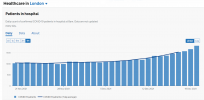Boris Johnson is unlikely to impose further coronavirus restrictions before Christmas after delaying a decision today.
The prime minister called a cabinet meeting this afternoon to discuss the latest data on the spread of the Omicron variant and whether a two-week circuit breaker banning indoor mixing was needed.
The Times has been told that both he and cabinet ministers do not believe the latest information is sufficient to justify a circuit breaker.
Johnson has pledged to recall parliament if he decides to implement further restrictions, a process that takes 48 hours. Given that millions of people are travelling for Christmas in the coming days, a government source said that the logistics meant it was unlikely there would be pre-Christmas restrictions.
A government source said: “The data isn’t there yet to justify further restrictions. There’s still so much that we don’t know about the severity of the variant and the extent to which vaccination and boosters sever the link between cases and hospitalisations.”
However, ministers are still considering plans for a circuit breaker after Christmas. This would ban people from different households from mixing indoors and introduce possible restrictions on hospitality. December 28 has been pencilled in by officials as a possible starting point for new curbs — taking into account the 48 hours needed for recall.
Johnson had faced a cabinet revolt over the prospect of further restrictions before Christmas. A third of the cabinet have made clear that they will not support them and have questioned official modelling.
Speaking for the first time since he resigned on Saturday, Lord Frost, the former Brexit minister, said that while he supported Johnson personally he could not back the ‘coercive’ rules.
The Times disclosed this morning that Rishi Sunak was one of at least ten cabinet ministers who were resisting calls by scientific advisers for tougher curbs to be introduced before Christmas.
Sunak is said to have wanted to delay introducing restrictions until the information became clearer. He also suggested that more models be considered before making a decision that could cost the economy billions.
Other ministers who had similar concerns included Kwasi Kwarteng, the business secretary, Jacob Rees-Mogg, the leader of the Commons, and Grant Shapps, the transport secretary. Liz Truss, the foreign secretary, was also said to be “instinctively opposed” to further restrictions. Javid and Michael Gove, the levelling up secretary, were said to be the strongest proponents of further restrictions.
There were suggestions that there could be more resignations if Johnson pushed ahead and announced new Covid restrictions.

